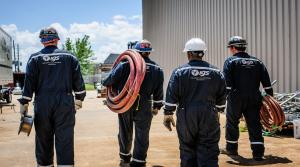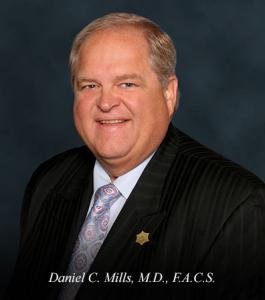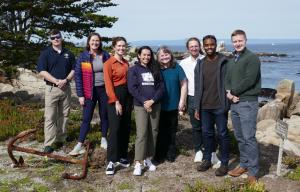
Students and faculty from the Naval Postgraduate School (NPS) are participating in the inaugural cohort of the Climate Security Fellows program, joining counterparts from the Stanford Doerr School of Sustainability.

Climate Security Fellows and faculty from the Naval Postgraduate School (NPS) get exposure to marine science research at Stanford University's Hopkins Marine Station on Monterey Bay in Pacific Grove, Calif..
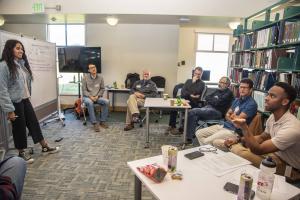
Climate Security Fellow U.S. Navy Ensign Nicholas Hilaire, right, leads a breakout session with students and faculty from the Naval Postgraduate School (NPS) and Stanford during the Oceans Workshop at Stanford’s Hopkins Marine Station in February 2024.
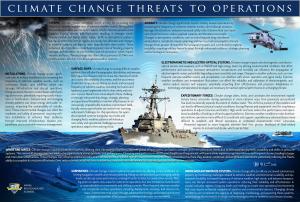
Climate change threatens many areas of Navy and Marine Corps operations, including those conducted by surface ships, aircraft and submarines.
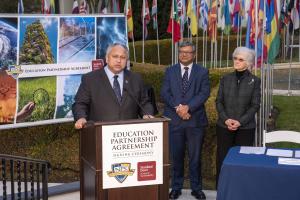
Secretary of the Navy Carlos Del Toro attended the signing of an Education Partnership Agreement between the Naval Postgraduate School (NPS) and the Stanford Doerr School of Sustainability on Dec. 15, 2022.
MONTEREY, CA, UNITED STATES, September 13, 2024 /EINPresswire.com/ -- Rising sea levels and global temperatures, more severe and frequent droughts, floods, wildfires and extreme weather increasingly inflict devastation across the planet – not only to people and their homes and livelihoods, but also to infrastructure and the environment that encapsulates it all. These tragedies are not limited by borders and pose increasing risks to national security.
The U.S. Navy and Marine Corps operate in every domain, and the effects of climate change also impact naval operations and readiness. To help understand and address these clear present and future dangers caused by the climate crisis, the Naval Postgraduate School (NPS) and the Stanford Doerr School of Sustainability joined forces through an Educational Partnership Agreement signed in December 2022.
As part of the agreement, the two institutions launched a new Climate Security Fellowship program. Twelve graduate and postdoctoral students from NPS and Stanford formed the initial cohort of Climate Security Fellows, charged with the development of new ideas and innovative solutions to operational threats facing the Navy and Marine Corps. The solutions are “tactical to practical,” helping to drive technological advancements scalable from early-adopter military use to affordable public applications, such as resilient microgrid development for naval installations.
The initial cohort of Climate Security Fellows represented a wide range of educational backgrounds and real-world experiences. Those from NPS included mid-career Navy and Marine Corps officers, a recent U.S. Naval Academy graduate, and civilians. They studied infrastructure defense, law, meteorology and oceanography, national security affairs and operations research. Fellows from Stanford studied electrical engineering, interdisciplinary ecology and sustainable design and construction.
Applications for the next cohort of Climate Security Fellows are now open. For this next group, the fellowship will grow to 20 students, with new institutional partners – George Washington University and the Naval War College – joining the effort. The Army War College has formed its own Environmental Security Fellows program, which will add to Department of Defense (DOD) perspectives and collaborative actions across the joint force.
The Climate Security Fellowship started as students answered the call from mobilized efforts made by DOD, the Department of the Navy (DON) and NPS, in response to White House Executive Order No. 14008, “Tackling the Climate Crisis at Home and Abroad.”
Threats and the Navy’s Early Support of Climate Science
The land, sea, and air are essential environments where the Navy and Marine Corps must operate, and the effects of climate change are increasingly shaping environmental conditions. Threats come from all directions and can adversely impact many operations, such as those conducted by surface ships, aircraft, submarines, expeditionary forces, uncrewed autonomous systems, and more.
It should come as no surprise, then, that the DON has long funded climate science-related research to help leaders make informed decisions . In fact, this practice dates to the start of one of the earliest and most important climate science investigations. During World War II, oceanographer Roger Revelle served in the Navy as the commander of the oceanographic section of the Bureau of Ships, and his research included sonar detection of submarines.
After the war, he returned to the Scripps Institution of Oceanography as director and continued his research, which was heavily funded by the Office of Naval Research (ONR). He grew concerned over greenhouse gas emissions and looked more into climate change, specifically into carbon dioxide gas absorption by the oceans and atmosphere.
In 1956, Revelle hired Charles David Keeling to begin highly accurate and systematic measurements of carbon dioxide in the atmosphere high above the newly constructed Mauna Loa Observatory, which the military also helped establish. Keeling’s work led to some of the most definitive evidence identifying the relationship between increasing carbon dioxide in the atmosphere and the rapid global warming that had occurred over the past century.
The measurements Keeling began in 1958 continue to be made to this day by Scripps, which is a longtime collaborator in oceanographic studies with NPS. The results formed the well-known Keeling Curve. Though among the most famous climate science research, the Keeling Curve is now just a mere stone in the mountain of scientific evidence that formed the foundation for subsequent actions by the Navy, the nation, and the world.
Formation of the Climate Security Fellowship
Understanding and predicting the impacts of climate change on Navy and Marine Corps operations demand clear understanding and science-based decision making.
Secretary of the Navy Carlos Del Toro, an NPS alumnus, issued a call to action to combat the climate crisis in his 2021 strategic guidance. “Climate change seriously increases the potential for greater conflicts on a global scale. We must be prepared to understand increased threats to other nations and the impact they may have on our own national security interests,” Del Toro stated in the guidance, which named climate change as one of the four top challenges facing the Navy and Marine Corps.
In response, NPS formed the Climate Security Network (CSN) to help address these needs.
“NPS pulled together faculty, students, alumni and external partners that are concerned about the impacts of climate change on national security,” said NPS researcher Kristen Fletcher, who co-founded CSN. According to Fletcher, CSN’s mission is to meet DON and DOD goals of building climate resilience and reducing climate threats by fostering collaboration and information sharing.
Fletcher had already begun collaborating with the 2021 Barrow Fellowship program at Marine Corps University. “I was a mentor and presenter for the Barrow Fellows,” she said. “The program focuses on a different topic each year, and the topic that year was climate change and national security.”
In May 2022, the Navy released “Climate Action 2030,” a strategic plan which the NPS CSN team helped to develop. This plan formalized Del Toro’s guidance into a roadmap for how to implement the fight against the climate crisis and achieve the DON’s goals.
Four months later, in September 2022, the Stanford Doerr School of Sustainability was founded, and in December of that year with Del Toro present, the Doerr School established its first educational partnership with NPS. The institutions have since held meetings and workshops concentrating on how they will collaborate on ocean sciences, energy security, and climate security and sustainability.
These efforts included the Navy’s second Climate Tabletop Exercise in April 2023. The event, which focused on energy and water security and coastal resilience actions, was attended by Assistant Secretary of the Navy for Energy, Installations and Environment (ASN EI&E) Meredith Berger, Stanford Doerr School of Sustainability Dean Arun Majumdar and NPS President retired Vice Adm. Ann Rondeau. Less than a year later, in February 2024, students and faculty from NPS and Stanford gathered at an Oceans Workshop to exchange ideas and information about dozens of their ongoing research projects.
By that time, the institutions had already taken another step forward in the partnership. Using the Marine Corps University’s Barrow Fellowship as a model, they launched the Climate Security Fellowship in November 2023 for their graduate and postdoctoral students. Fletcher would coordinate the fellowship for NPS.
The uniqueness of the fellowship’s format and learning opportunities excited civil and environmental engineering professor Jack Baker, the associate dean for faculty affairs in the Stanford Doerr School of Sustainability, who became an advisor to the fellows.
“The interactions between students who are thinking about fundamental problems around climate change and its impacts on adaptation with students who have operational experience and engage with real-world problems allow them to use their collective knowledge to address solutions in a more immediate and effective way,” Baker said.
This complementary collaboration between NPS and the Stanford Doerr School of Sustainability accelerates the pace of far-reaching implementation. Because solutions address national security needs, they can be funded and developed at scale with potentially much broader impact.
Mark McVay coordinates the fellowship for Stanford and is a fellowship advisor. A Naval Academy and Stanford graduate, he recognizes the importance of scalability for technical solutions like microgrids.
“Future military and civilian leaders must understand what climate change is doing to national security,” said McVay. “And it’s not just about defense. It’s about people and how they live.”
Inaugural Fellows Get Underway
When the students committed to becoming Climate Security Fellows, they took on responsibilities above and beyond their field of study and research requirements. In addition to becoming CSN members, they attended a series of instructional modules that included the topics of climate change science, physical hazards and resilience, oceans and climate security, climate change communications, financial considerations, risk assessment and food security.
U.S. Navy Lt. Caroline Kelly operated and navigated an amphibious aircraft carrier as a surface warfare officer before transferring to the METOC (meteorology and oceanography) community and beginning her master’s degree studies at NPS.
“I joined the fellowship mainly because of my own passion for the issues,” Kelly said. “I also know that climate and climate change directly relate to my professional work in the Navy.”
Kelly believes it’s important to incorporate both military and civilian perspectives in the program. “In the future, I only see us in the military working closer and closer with the civilian world regarding climate change,” she said. “The problem doesn't just impact the civilian world, but it also impacts our operations in the military. To find good solutions and to really get the issue addressed, I think we need to accept that it's affecting people on both sides.”
Stanford postdoctoral student DeVant’e Dawson earned his Ph.D. in interdisciplinary ecology and researches super reefs containing heat tolerant corals across the Pacific Ocean and in the Caribbean. “I was in Majuro doing my first ever fieldwork, but I knew that at some point I wanted to possibly transition into policy,” he said.
While there, he received an email announcing the new fellowship and recognized its potential for approaching climate change from another pathway.
“I jumped at the opportunity to get my foot in the door,” Dawson said. “I think the first step is science communication across sectors. My biggest goal was figuring out how does what I study intersect these other areas that may not necessarily think about coral, and how could I communicate it in a way that reaches more people than I initially thought it could.”
U.S. Navy Lt. Dishan Romine is a human resource officer working on his master’s degree in operations research. A former surface warfare officer, he now researches climate and its impacts on water infrastructure.
“The opportunity to be a climate security fellow was perfect for me because I knew that it would help with my research and thesis,” he said. “If you have climate change that impacts electricity or impacts water on your military base, and you're unable to train, perform and provide health and hospitality services to personnel, then how are you going to be able to actually deploy on your mission?”
Romine knows how important operational readiness is for the military, and he feels operations research helps provide the answer with the data analytics that military leadership needs to keep it all running. What the Navy learns about resilience can be applied beyond ships and installations.
Fellowship Results
To complete the fellowship, the Climate Security Fellows worked in three teams that were supported by advisors from NPS and the Stanford Doerr School of Sustainability. Each team chose its own current climate change issue for a project to investigate, and then the Fellows applied their new training and skills to research them. The teams presented their results and wrote the following research project reports:
- “High Waters, High Costs: A Case Study on Naval Air Station Key West to Guide Decision-Making for Resilience Versus Managed Retreat,” written by DeVant’e Dawson, Rebecca Grippo, Nicholas Hilaire and Joseph Ward, with advisor Dan Eisenberg.
- “The Impacts of Food and Water Security in Southeast Asia with Insight into the U.S. Role,” written by Anna Broome, Caroline Kelly, Dishan Romine and Colby Smith, with advisor Mark McVay.
- “Tropical Cyclone Disaster Response Through a Climate Resilience Lens,” written by Marina Lesse, Katie Lindman, Emily Pesicka and Issac Tham, with advisor Justin Rogers.
U.S. Marine Corps Capt. Colby Smith graduated from the NPS Department of National Security Affairs. As a fellow, he was impressed by learning how the private sector, higher public education and military intersect and how far this broad partnership could go.
“All of these people coming together to talk about both the problems and the solutions, I think, is probably the single biggest advantage of the fellowship,” Smith said.
Smith’s work as a fellow overlapped with his NPS studies. “The topics we covered aligned to how the Department of the Navy is addressing its climate security strategy,” he added. “A lot of what I picked up directly impacts my assignment after NPS. I personally benefited, significantly, from our research project because we covered food and water security in Southeast Asia.”
Marina Lesse, co-lead of CSN and a faculty associate-research in NPS’ Energy Academic Group, is also a fellow, and is earning her master’s degree in national security affairs at NPS. “I enjoyed the integration of civilian students and military students because there was a sharing of perspectives that was very beneficial to everybody,” said Lesse.
She recognizes the demand for climate studies is coming not just from the fellows, but from many other students as well.
“When I'm in class and I bring up that I'm focusing on climate change, everybody is super interested and has stories to tell about climate issues they’ve experienced while on deployment,” she said. “Who's going to be responding to these crises and conflicts caused by climate change? Yeah, people who are attending NPS and will be heading into the fleet after they graduate.”
Climate Security Fellows for the Future
Acting on science-based decision making by the Navy and other armed services within the DOD is imperative for the safety and prosperity of the nation. But to solve the climate crisis, it will take important partnerships between the military and civilians across many parts of society.
Del Toro added, “Today, climate change is one of the most destabilizing forces of our time, exacerbating national security concerns and posing serious readiness challenges for our fleet and force. There exist numerous tangible examples of the impact of climate change on Navy and Marine Corps operations all over the world.
“I look forward to seeing the work our Climate Security Fellows accomplish. The expertise of two globally-recognized hubs of research and innovation – the Naval Postgraduate School and Stanford University – will undoubtedly find practical solutions that our Navy and nation can implement both now and in the future.”
The partnership between NPS and Stanford’s Doerr School has shown just how to lead the way by working together, sharing perspectives, following the science and taking much-needed action. The first 12 Climate Security Fellows from NPS and Stanford are now part of the solution, and the expansion of the program to 20 fellows with new institutional partners is another important step forward.
Lt. Cmdr. Ed Early Naval Postgraduate School+1 831-656-3567[email protected]
Legal Disclaimer:
EIN Presswire provides this news content "as is" without warranty of any kind. We do not accept any responsibility or liability for the accuracy, content, images, videos, licenses, completeness, legality, or reliability of the information contained in this article. If you have any complaints or copyright issues related to this article, kindly contact the author above.
You just read:
News Provided By
September 13, 2024, 18:06 GMT
EIN Presswire's priority is author transparency. We do our best to weed out false and misleading content. The content above is the sole responsibility of the author who makes it available. If you have any complaints, kindly contact the author above.
Originally published at https://www.einpresswire.com/article/743287222/inaugural-nps-and-stanford-climate-security-fellows-answer-the-nation-s-call

